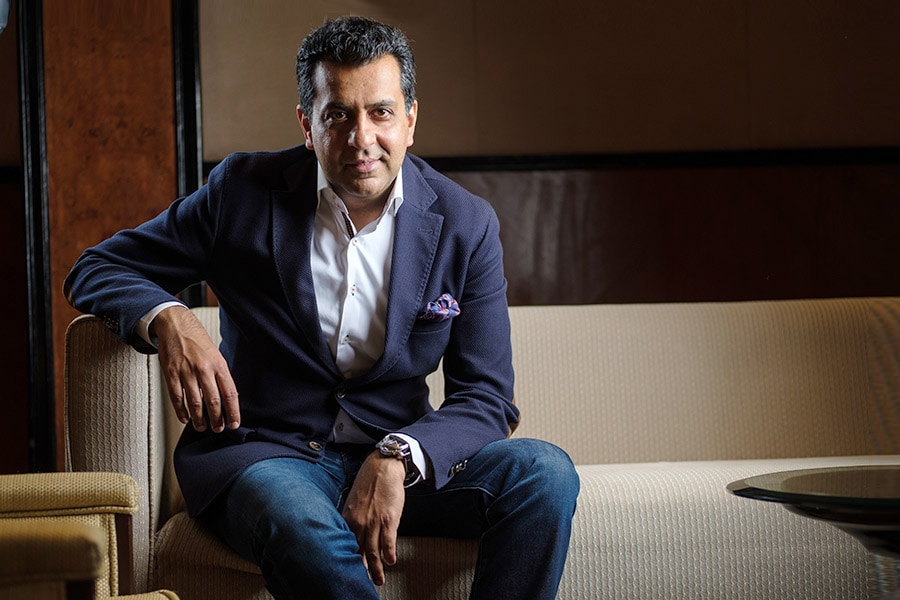Mphasis: Setting up for stronger growth ahead
Breaking down silos and tapping existing strong customer networks and new deal wins is showing results at the Blackstone company


 Nitin Rakesh, CEO, Mphasis
Nitin Rakesh, CEO, Mphasis
Image: Nishant Ratnakar for Forbes India
“Last year I travelled 200 days, but no bank ever gave me a card personalised to my needs,” Nitin Rakesh, CEO of Bengaluru-based IT company Mphasis, pointed out. “They all give me the same old platinum cards or the same old gold cards.”
He was making a point about the lack of personalisation among traditional corporations, which is a massive opportunity for Mphasis, where Rakesh took on the top job in January 2017. This was shortly after the nearly 30-year-old company — once part of Hewlett Packard — was purchased by private equity company Blackstone.
Rakesh, who has a storied career spanning financial services to information technology, and in multiple geographies, set the company on a two-pronged strategy of helping Mphasis’s customers transform their backend systems on the one hand and building data-driven nimble applications for the world of apps and cloud computing, on the other. This is what the end consumer is already used to, he said in a recent interview with Forbes India.
Traditional corporations such as banks and insurance companies — which are among Mphasis’s biggest customers — need just this kind of two-pronged change, the IT company is betting under Rakesh. Their end consumers have already come to expect the same kind of personalisation from every transaction. Facebook, Amazon, Netflix, and Google have made them habituated to it via their smartphones.
“The mission is very simple. First, Mphasis had a pretty strong set of services offerings on the digital side. I realised that we did great work in pockets, but we needed to stitch it all together into one service offering,” Rakesh said. And “the benefit you get coming from outside is you don’t have any baggage of history, you don’t look at silos the way people would internally look at silos and nothing is a stupid question when you’re looking at things with a fresh pair of eyes.”
That’s how it panned out and Mphasis ended up creating a set of go-to-market approaches, which repackaged everything it had internally and added investments in a few more areas. “It’s a two-pronged approach comprising what we call front-to-back digital transformation and service transformation.”
The first part is the unglamorous work of transforming existing IT systems — which are often three or four decades old — to speak to an intermediate layer. That intermediate layer in turn is where a lot of the data-driven magic happens, as it interacts with the customer-facing apps in the front, and the old IT systems in the back.
The second part of the two-pronged approach is about helping organisations pivot from focusing on the back office and helping them to get closer to their end consumer. “And how does one deploy technology to help our customers become more customer centric,” Rakesh said. That’s how Mphasis has flipped its own operations — starting in front of the customer and deploying technology and data to facilitate personalisation, while working with the back office systems to transform them as well.
The results are beginning to show as the Mumbai-listed company’s latest quarterly earnings showed. For the April-June quarter in the current fiscal year, the company grew profits by 38 percent to Rs 258.3 crore. Analysts at HDFC Securities noted that the “momentum continues” at the company, after it posted a “strong quarter.” They expected “broad based growth” to continue for reasons including “strong deal trends, increase in average deal size and expansion of European footprint.” Mphasis also brought in a strong set of new contract wins, with total contract value of $153 million.
“We focused primarily on bringing in this growth mindset, taking advantage of the reset (started last year) in driving some form of cultural shift,” Rakesh said in the interview. This entailed “getting focused on the market, opportunity in our client base, focused on making the most of our new stakeholders and essentially take the best of all the worlds — that’s what we have been working on.”
First Published: Aug 24, 2018, 13:08
Subscribe Now